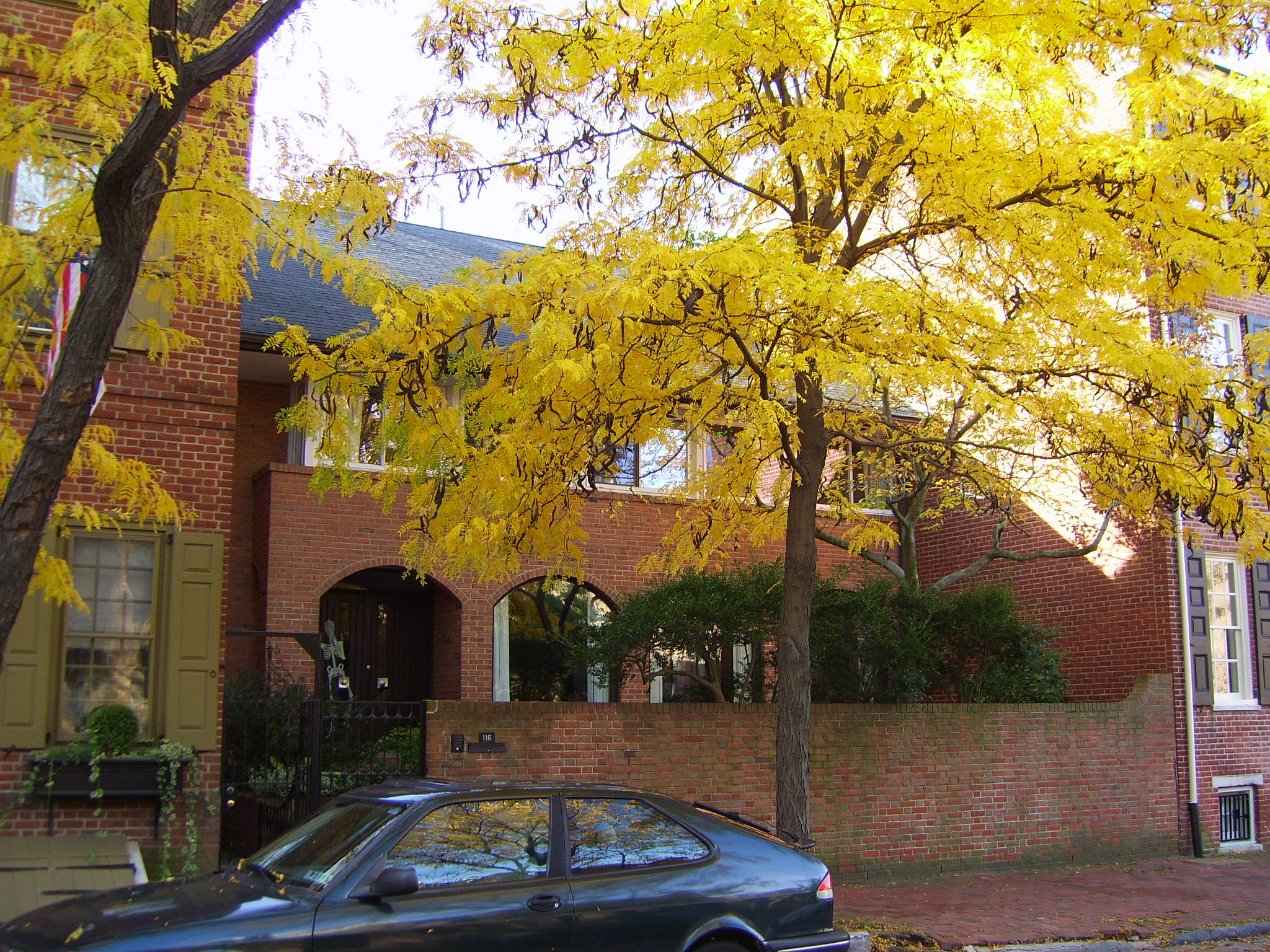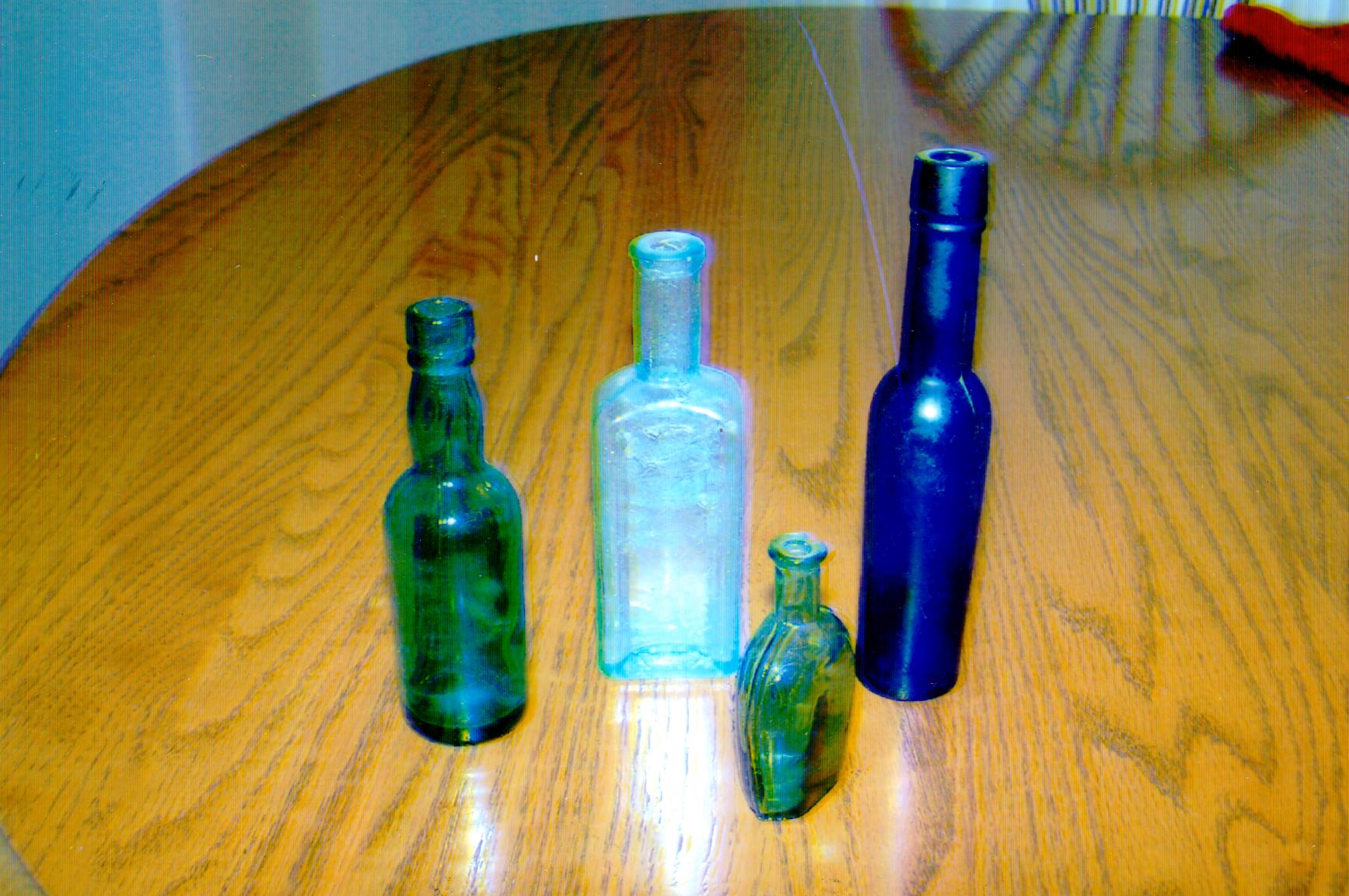When Gregory Stevens (b. 1966) was growing up in Society Hill, the bears were bigger than they are now. Others of his generation who were interviewed made the same observation.
Greg’s parents, Dorothy and David Stevens, built a house at 116 Delancey Street. He started school at McCall’s, the neighborhood public school, but soon switched to Friends Central in Wynnewood. That required a lengthy commute by bus and subway, which Greg did not like (particularly because of the diesel fumes). He transferred to St. Andrew’s Boarding School in Delaware.
When he was not at school or commuting, he and his friends liked to ride their bicycles on I-95 when it was under construction, play baseball, fly kites, and dig around in the vacant lots (of which there were still a fair number in the neighborhood). Abandoned wells that had been converted to trash pits often contained interesting pottery or glass shards, which the boys would try to glue together. In the winter, they went sledding at Society Hill Towers, being careful to stop before colliding with cars parked at the bottom of the hill.
Greg says that, as a child, he did not give much thought to the neighborhood where he lived. As an adult, he realizes that growing up in the city made him more self-reliant; he learned how to handle himself in a city. He observes that, while cities can be intimidating, you can enjoy yourself once you learn how they work: “what’s safe and what’s not safe.” That probably includes the bears, even if they are the Three Bears sculpture in the neighborhood park.
DS: This is an interview with Gregory B. Stevens. The date is July 8, 2010; the location is at his home in Ann Arbor, Michigan; the interviewer is Dorothy Stevens.
[Tape is turned off, then on again]
DS: Gregory, tell me when were you born?
GS: 1966, April 6.
DS: Did your parents live in Society Hill at the time?
GS: Yes.
DS: Where did they live?
GS: 116 Delancey Street.
DS: Do you have siblings?
GS: Yes, Chris and Jay [Jason].
DS: They were older? Younger?
GS: Chris is two years older, and Jay is four years younger.
DS: You were right in the middle. Where did you start at school?
GS: McCall School, and then [I] went to Friends Central. (1:00)
DS: After that?
GS: St. Andrews’s Boarding School in Delaware.
DS: After that?
GS: Princeton for my undergraduate degree in Mechanical Engineering; then I got my Master’s in Mechanical Engineering from Stanford.
DS: What do you remember about those early days at McCall School? That was the local public school?
GS: I remember not a lot. I remember being afraid of my first-grade teacher. I can’t remember her name.
DS: Mrs. Walker?
GS: She was a difficult one. I remember not being able to see the board and not knowing that was unusual until we realized I needed glasses. I remember once [I] got (2:00) to Friends Central, [we] figured out the reason I was reading so slowly was that I was saying every word in my head; the phonics education that they taught at McCall’s was something that I learned too well. Sounding everything out in my head made me a slow reader. Still today, but it makes me a thorough reader, too.
DS: Good for engineering.
GS: Yes.
DS: How did you get back and forth – to McCall’s you walked, and to Friends Central – how’d you get back and forth?
GS: Bus, school bus, or subway, or somebody drove us.
DS: You played after-school sports, so you missed the school bus and come in by subway? (3:00)
GS: Subway sometimes, yes.
DS: There was a subway system out near Friends Central?
GS: Somehow, I don’t remember exactly, we got a city bus, I think, to wherever the railhead of the subway was and then took the subway into town, through West Philadelphia, which was an adventure.
DS: Because?
GS: Because it was a tough neighborhood in Philadelphia, and I got mugged once on the subway. There were always people on the subway you had to be wary of.
DS: When you say you got mugged on the subway, what does that mean?
GS: A group of tough-looking kids came up and asked us if we could tell them (4:00) what the time was, which we basically knew meant they wanted to see if we had watches. Then they took our watches, which was, whatever, a $10 Timex watch. It certainly wasn’t worth fighting over. It was a life lesson.
DS: Did it sharpen your senses at a younger age than for most children?
GS: Yes, it certainly makes you know of the need to be aware of your surroundings and think about who’s where and what their motivations are.
DS: Hmm. Good lessons. Did your classmates, were any of them neighbors? (5:00)
GS: Yes, there was Jeff Greenberg and Andrew Miller.
DS: They were your age and went out there also?
GS: Yes, in the same class.
DS: Do you remember the teachers’ strikes at all? At the public school?
GS: Yes, I remember that there were teachers’ strikes, which always made me happy, because you got to miss school, but I don’t really have any strong memories of that.
DS: Tell me about the people that you met at Friends Central. Did you fit in (6:00) right away? Was there any difficulty there?
GS: I don’t remember any problem fitting in. They were all kids like us.
DS: You had suburban friends?
GS: Yes. The vast majority of Friends Central kids were suburban.
DS: Would they come into the city with you?
GS: I don’t remember any of them coming into the city, no.
DS: Would you go to their houses?
GS: Yes, occasionally.
DS: Did you think about how you were different from them? I mean, how you lived? Where you lived?
GS: I clearly remember being annoyed at how long it took to get to school. I remember not being happy that I had to spend, whatever it was, about an hour, I think, (7:00) each way of my day commuting. It wasn’t something that I remember wishing it were different. It was sort of like that was my life. It was what needed to be done. Clearly, going to boarding school was influenced, I think quite a bit, by being able to avoid that commute every day. Boarding school has no commute, so that’s much better, and all your classmates, all your friends, are living on the same hallway as you. You avoid the commute, and you have all your friends there 24 hours a day. I think those (8:00) probably were two big reasons for going to boarding school. I still remember all the diesel fumes on the buses, and sitting there on the bus and getting to school. You felt like you were still breathing diesel because of the diesel fumes on the bus, and the subway was an adventure. It wasn’t fun, but I don’t remember wishing that I was a suburban kid just to avoid the commute. It was just something that I accepted and just did. Of course, when I had a chance to not do it, I took that chance. (9:00)
DS: Did your family attend religious services?
GS: Yes, St. Peter’s?
DS: Did you go, too?
GS: Yes, Sunday school and choir.
DS: You sang in the Boys’ Choir there?
GS: Yes.
DS: Anything significant about that? Did you like it or was that a chore?
GS: It was a chore.
DS: Did you get paid?
GS: I got paid a really nominal amount for choir, yes.
DS: The fact that your parents had a car, how did that help?
GS: It let us go to the horse farm, which is certainly a fond memory I have. (10:00) That was a lot of fun.
DS: What was the horse farm?
GS: Property in Allentown where we’d go and spend the weekend camping out, and have cookouts over the campfire, sodas in the stream to keep them cold, and what were those pudding things? Snack packs. Those were a lot of fun.
DS: Very different from life in the city?
GS: Yes. Having the pond right there to swim in. That was fun.
DS: Where did you play at home, in the city, and what would you play?
GS: I remember riding our bikes around a lot. There were parks where we could set up bike ramps, and we’d go and do jumps off the bike ramps. I remember the big (11:00) hills at the [Society Hill] Towers were a lot of fun, because you could get a lot of speed, coming down the big hills from the Towers. I remember playing baseball and stuff, up on the Towers grass area, which mostly they tolerated, but occasionally they’d chase us off. I remember the Davies’ kids were there. Having all the old empty lots was kind of nice, because you had a bunch of weedy, overgrown lots which were good for whatever – flying (12:00) a kite. Even though it was in the city, it actually felt like a reasonable amount of open space. Digging around the foundations was something that was a lot of fun. The colonial foundations, you could dig around them and find old wells that they had, which they had used as garbage areas after the well was not being used any more. There were old bits of pottery, so we’d dig down to get the pieces of pottery and glue them together. The people that owned the lots didn’t like us. I remember, they used to bring big rocks and drop them down the wells so we couldn’t dig into them anymore.
DS: You would get into them? You’d go down into them? That sounds dangerous.
GS: Yes, that’s what they thought. That’s why they put the big rocks in (13:00) them, so we couldn’t do that anymore. I also remember digging under some walls at one point, and we found some bones. Of course, we thought they were human or something. We took them to the Franklin Institute and they told us they were dog bones. That was a little bit less dramatic than what we hoped. We just needed to be able to dig under foundations that you knew were from the Colonial period. See that bit of history that was buried there. That and the other big recreation was when the old Mariners Church would catch on fire. That was good fun, as a little kid.
DS: Good fun? [Laughs]
GS: Yes, it was exciting, with the fire trucks. You don’t quite have a sense for (14:00) destruction of property and things like that as little kids. It was more just a lot of excitement and people and firemen and big trucks and that kind of thing.
DS: Would you say that you felt free or controlled? Did your parents control you, or did you feel free to roam where you wanted?
GS: Yes, I felt very free to roam, probably [more] free to roam than my kids feel.
DS: [Laughs] Did your parents teach you any particular skills or practices about living in the city, like traveling on public transportation; walking instead of (15:00) using the car; dealing with potential muggers or crime; situations taking advantage of cultural things in the city; relating to people in the neighborhood?
GS: I remember it was a big deal when I could finally cross Second Street from Delancey, without a parent. That was a big moment for me, so there were clearly those sorts of common sense limitations. I guess I don’t particularly remember a lot of instruction one way or the other, other than “Keep your head up.”
[Sound of telephone ringing. Tape is turned off, then on again]
DS: Tell me, would you stay in the city for the summer?
GS: Yes.
DS: Did you go to camp?
GS: Yes. Two, three years of overnight camp in Maine. (16:00)
DS: You’d be able to get out of the heat of Center City?
GS: Yes, Maine was very nice in the summers.
[Tape is turned off, then on again]
DS: In the winter, when it would snow and you couldn’t go to school, what would you do?
GS: I remember sledding down the hills at the Towers, which was always a somewhat dangerous thing, because there were parked cars at the bottom of the hill. I think it was Erik Davies who broke his nose on a parked car. Yes, you had to know how to stop quickly.
DS: Did you take advantage of the city and the museums? (17:00)
GS: Yes, I remember the science museum especially, and the library some and the art museum occasionally and the natural history museum. My favorite was the Franklin Institute; that was good fun.
DS: Do you remember the babysitting co-op?
GS: I remember babysitters; I don’t remember a co-op specifically.
DS: Did your parents prohibit you or discourage you from going to South Street?
GS: I guess I don’t remember that it was prohibited. I recognized South Street as somewhat riskier than some other places, but I don’t remember being prohibited. I remember going to the “Rocky Horror Picture Show” late at (18:00) night at the TLA, Theater of the Living Arts. That was an interesting experience, with all the people [in the audience] acting out the different parts as the movie was [playing].
DS: How old were you at that point?
GS: I can’t remember specifically.
DS: High school?
GS: I don’t even know.
DS: Junior High School?
GS: Don’t know.
DS: Did you go down to the Delaware River or did you go biking on I-95 before it opened?
GS: Yes, I remember that. It was a lot of fun, biking on it when it was closed, and you could bike on the highway as they were building it. Going down to the river (19:00) was fun, although it used to smell, which wasn’t good. I remember there was that one guy who did that diving show or something into the Delaware. We could care less about what he was doing in the actual dive, just that he would dive into the Delaware; that was pretty gross.
DS: When you were young, did you ever think that you lived in a special neighborhood or one that was quite different from any other place?
GS: Looking back on it, it’s clear that it was quite different, but I don’t ever remember thinking that growing up. It wasn’t something I questioned or thought about. It was just where I was. (20:00)
DS: What did you not like about living in Society Hill?
GS: Well, certainly the commute to school. Nothing else really jumps to mind.
DS: How do you feel now about your young years growing up in Society Hill?
GS: I think, looking back on it, it clearly was a unique experience.
DS: How do you think it affected you?
GS: I think it certainly gave me the ability to know that I can handle myself (21:00) in a city, since cities can be intimidating for some people. Once you know how they work, what’s safe and what’s not safe, and how to stay aware of your surroundings and all those sorts of things, then you can be much more relaxed and you can handle situations as they come up.
DS: You definitely think it has influenced your life as a person, then?
GS: I’m sure it has. You have to be more self-reliant, living in the city. (22:00) There’s not a group of parents constantly hovering to make sure that everything is going to be OK. You have to make sure you take responsibility for yourself. I think that makes you a more self-reliant person in the long run.
DS: Any other stories or memories of your childhood that you want to tell us?
GS: Nothing jumping to mind. I think we hit the major ones already.
DS: Do you ever return, since your parents still live in the neighborhood? What changes do you see when you go back now?
GS: I only return very occasionally. The main thing, since I went away to (23:00) boarding school, is that everything looks a lot smaller. Once I went to boarding school, I was away so much of the time, my memories were sort of as a smaller person. The three bears at Three Bears Park were a lot bigger than they are now. A lot of charm of the neighborhood has been well preserved, so it’s clearly a nice place to go back and visit.
DS: Thank you, Gregory. Thank you for your memories.
GS: Certainly.
[End of Interview]
©2010 Project Philadelphia 19106™. All rights reserved.


116-118 Delancey Street
Photograph by Cynthia J. Eiseman
116-118 Delancey Street
Photograph by Cynthia J. Eiseman
116-118 Delancey Street - Stained glass interior window
Photograph by Cynthia J. Eiseman

Bottles found in late 1960s by Christopher Stevens
Photograph by Dorothy Stevens